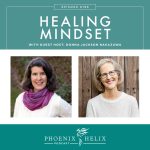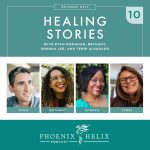
Epigenetics + Nutrition = the Power of Food as Medicine
We are more than our genes. Epigenetics is a field of science that studies what influences our genetic expression. These are the things that turn our genes on and off. Our body is dynamic and it’s changing all the time in response to our environment and daily choices. Epinutrients are the nutritional compounds that alter genetic expression in a positive direction. My guest is Dr. Kara Fitzgerald. She is a naturopathic doctor and clinical researcher, whose research focuses on the epigenetics of diet and lifestyle. She’s also on the faculty of the Institute for Functional Medicine and lectures internationally. Her book, Younger You, is a deep dive into the science of Epinutrients.
Listen to the Show
- Subscribe to my podcast through your favorite podcast app: iTunes, Google, TuneIn, Spotify, Amazon, etc.
- You can also listen to the episode right here through the player below, and if you subscribe to my newsletter you’ll get notified of future episodes.
Podcast: Play in new window | Download
Show Notes
- Intro (0:00)
- Thank You to Our Podcast Sponsor – Fully Healthy aka ShopAIP (2:38)
- FullyHealthy.com is the new home of ShopAIP, an online store dedicated to the Paleo Autoimmune Protocol. With hundreds of items for the elimination phase of the AIP, and products labeled by reintroduction category as well. You can find protein bars, sauces and condiments, AIP-friendly spices, cooking and baking ingredients, waffle and pancake mix, delicious snacks, and more. It can be hard to find AIP products. Fully Healthy makes it easy!
- In addition to AIP foods, Fully Healthy is expanding their offerings to accommodate other specialty diets as well. That’s the reason behind the name change. Their goal is to make healthy shopping easy for you and your whole family!
- Everything on the website is clearly labeled with multiple ways to find the products you need. If you’re not sure where to begin, check out the Phoenix Helix Bundle, which contains some of my favorite AIP pantry items.
- Go to FullyHealthy.com and use the code PHOENIX for 10% off your first order!
- Meet Dr. Kara Fitzgerald (4:09)
- Dr. Kara Fitzgerald is a naturopathic doctor and clinical researcher, whose research focuses on the epigenetics of diet and lifestyle.
- When she was in her 20’s, she developed chronic fatigue. Conventional medicine didn’t help. All her labs came back normal, and the doctors had no advice. Her landlady recommended she see a naturopathic doctor, and the advice she received there was very helpful. After a few dietary tweaks and some basic supplements, her chronic fatigue went away. This happened at a pivotal time in her life when she was considering graduate school and led to her choice to go to naturopathic medical school.
- Around the same time, she was working in the supplement section of a health food store and fell in love with the biochemical mechanisms behind the supplements. After graduating from medical school, she did a double residency, working with patients in an integrative medical clinic, but also working in a lab alongside a nutritional biochemist. Her career has combined research with patient care ever since.
- Genetics vs. Epigenetics (9:13)
- In 2003, scientists finished mapping the human genome, and the expectation was that it would provide answers to all disease, including chronic disease. Very quickly, it was clear that wasn’t the case. With rare exceptions, there was no clear genetic map to chronic disease. This meant that health and disease involved more than our genes.
- Science pivoted toward epigenetics: trying to determine the factors that influence genetic expression for health vs. illness. The research in this field has grown exponentially.
- Research shows that our daily choices have a huge epigenetic influence (diet, exercise, sleep, mindset, etc.) Our environment has an impact (water quality, toxin exposure, etc.) Our childhood experiences also have an impact (ACEs). And stressful and traumatic experiences as an adult influence epigenetics as well, but thankfully so does healing and resilience.
- The name of my podcast, Phoenix Helix, has epigenetics woven into the name. When I was at rock bottom with rheumatoid arthritis and searching for hope, I chose the Phoenix as my symbol – the mythical bird that rises from its own ashes. I chose Helix to represent the power of epigenetics: the daily choices that make a difference. My podcast is all about harnessing epigenetics for health.
- Resource: Video illustration of the Epigenome.
- Inherited Epigenetics (15:53)
- There are some epigenetic changes that can be inherited based on our parents’ and grandparents’ experiences.
- That said, epigenetics are dynamic. If we inherited an epigenetic pattern for disease, we can change that pattern through our own efforts to one that supports health, and that healthy pattern can be inherited by our children.
- There’s growing research into how trauma of past generations influences the epigenetics of descendants. Dr. Fitzgerald would like to see more research focused on inherited healing and resilience.
- Thank You to Our Podcast Sponsor – Luminance Skincare (18:30)
- Today I want to highlight their bestselling facecare trio, which includes their Delicate Cleanser, Rosewater Toner, and Deep Hydration Moisturizer. Each one of these products has over 500 five-star reviews on their website. And they have a sample kit, so you can try it yourself! The Delicate Cleanser gently and deeply cleanses your skin without drying it out. The Rosewater Toner perfectly adjusts and balances the pH of your skin. The Deep Hydration Moisturizer mimics skin’s natural oils to soothe dry skin while maintaining a clear complexion.
- Whereas conventional skincare products are full of chemicals that can hurt our bodies, Luminance is made from ingredients that nourish. Their products are natural, organic, wildcrafted, non-GMO, and gluten-free (and they’re even made in a dedicated gluten-free facility). It’s the cleanest skincare anywhere! And everything is handmade in small batches within the United States.
- They have a complete face and body care line, including cleansers, toners, moisturizers, masks, acne serum, lip balms, haircare, sunscreen, handcrafted soaps, and more.
- Order their sample kit today, and once you fall in love and want to order full-size bottles, use the code HELIX for 10% off your order. (You can also use the HELIX coupon on any Luminance product, not just the facecare trio.)
- What Are Epinutrients? (20:05)
- Epinutrients are nutrients that support healthy epigenetic changes to our genome, turning on helpful genes and turning off unhelpful ones.
- There are many biochemical activities involved in epigenetics, dictating which genes are turned on and off. DNA methylation is one of the most studied because we have the technology to look at it closely. If you look at methylation research, the illustrations often show “red lollipops” attached to DNA. These represent methyl groups. When there are lots of “lollipops” on a gene, that gene cannot be turned on. If the “lollipops” are removed, then that gene can be turned on. Health depends on methylation, and our body is designed to make these “lollipops” in abundance. However, if we are experiencing chronic inflammation, we don’t make these “lollipops” as efficiently. Similarly, as we age, we don’t make as many.
- One category of epinutrients are called methyl donors. These are key nutrients that we need in order to make these “red lollipops”. Some of these nutrients include B12 (found in animal foods), Folate (found in dark leafy greens), Choline (found in eggs), Betaine (found in beets), and Methionine (found in animal protein). Some other foods that contain these key nutrients are mushrooms, seeds, and cruciferous vegetables.
- Another category of epinutrients are called methylation adaptogens. They direct where the “lollipops” go, and this is very important. Pro-inflammatory genes we want covered in “lollipops” so they get turned off. Whereas anti-inflammatory genes, detoxifying genes, and other genes associated with health – we don’t want to send “lollipops” there, because we want these genes turned on. Methylation adaptogens are found in many fruits, vegetables, herbs and spices. Some examples are EGCG (found in green tea), Curcumin (found in turmeric), Rosmarinic Acid (found in rosemary), Quercetin, Resveratrol, etc.
- The goal is to make sure every meal contains epinutrients that give your body information for optimal gene expression. Eat a wide variety of whole foods, with lots of fruits and vegetables, taking advantage of the seasons, and eating the rainbow. Use Dr. Fitzgerald’s book as a guide, which contains a 30 page appendix of epinutrients.
- Resources:
- Epinutrients Article.
- Dr. Fitzgerald’s book: Younger You.
- Dr. Fitzgerald’s Research Study (28:30)
- Dr. Fitzgerald and her team did a randomized clinical trial, which is considered the gold standard in research. They prescribed an 8 week intervention for patients.
- For the dietary portion, every forkful of food was a combination of epinutrients that were methyl donors and methylation adaptogens. No vitamins were prescribed, but patients were given a greens powder and a probiotic. The probiotic was included because a healthy gut microbiome actually makes epinutrients like B12 and folate.
- The program also included some healthy lifestyle recommendations alongside the diet.
- DNA methylation was tested before and after the intervention. At the end of 8 weeks they could see that the “red lollipops” had moved to a healthier pattern, showing the direct impact of diet and lifestyle on epigenetics. This is a very new field, and they are one of the first research studies to prove this.
- Resources:
- Link to the published study.
- Her book, Younger You, is based on this research
- Thank You to Our Podcast Sponsor – Captain Soup (30:49)
- Captain Soup sells nutrient-dense freezer meals, designed specifically to enable the body’s healing. They only use the highest quality ingredients including locally sourced, 100% grass-fed and finished meats, wild-caught seafood, 100% organic vegetables, and bone broth made in-house from the bones and organ meat from the best grass-fed lamb in the world.
- They sell 7 flavors of soup which are paleo, keto, and Wahls protocol-compliant. 5 of those flavors also fit the elimination phase of the Paleo Autoimmune Protocol. 4 of the flavors are Low-FODMAP. And 2 flavors are GAPS-compliant.
- Here are the flavors: Classic Lamb, Dijon Lamb, Italian Beef, Classic Beef, Dijon Beef, Green Machine & Tom Kha. (Tom Kha is a seafood soup that’s available in-season.) They also have the full ingredient list for every flavor on their website.
- You can buy pre-selected variety packs or build your own custom box. They also have a nutrient-dense liver pâté that can be substituted for any soup upon request.
- Order today and get nutrient density delivered to your doorstep! Use the code PHOENIX to save $25 off your first order.
- Epinutrient Supplements (32:33)
- Food is the foundation when it comes to epinutrients, and supplements cannot replace food. However, supplements can sometimes be helpful in addition to an epinutrient-rich diet.
- In Dr. Fitzgerald’s research study, she did prescribe a greens powder and a probiotic.
- There are also some epinutrients that are more bio-available as a supplement. Turmeric (Curcumin) is one example. Both Eileen and Dr. Fitzgerald take a curcumin supplement.
- If certain foods aren’t part of your diet, supplements can be used to get that epinutrient. For example, if you don’t drink green tea, you might benefit from green tea extract. If you don’t eat eggs, you might benefit from choline.
- And for people brand new to the idea of a healing diet who might be nutrient deficient overall, Dr. Fitzgerald might recommend taking a multivitamin for a little while.
- Note: always speak with your healthcare team before adding supplements to your regimen. And when trying new supplements, try one at a time to test how your body responds: positive, negative, or neutral. We are all unique.
- Foods to Limit (the opposite of epinutrients) (36:07)
- These are foods that alter genetic expression in a negative direction. Most of these aren’t surprising.
- Processed foods, manmade foods, foods with chemical ingredients.
- Overcooked foods, where the nutrients have been drained from them.
- Sugary foods.
- Excess alcohol.
- Excess vegetable oil and industrial seed oils.
- Foods that are charred and browned. Gently cooked foods preserve the epinutrients, whereas charred foods add some oxidized compounds that can be inflammatory.
- It doesn’t mean you can never eat these foods. Dr. Fitzgerald recommends considering them “treats” in your diet rather than the majority of the foods you eat.
- Top 3 Non-Food Tips to Positively Impact Epigenetics (39:08)
- Dr. Fitzgerald thinks of exercise like a vegetable. It has such potent benefits for the epigenome, it’s truly incredible – not just for ourselves but for our descendants. That said, people with autoimmune disease often find exercise challenging because it can sometimes trigger autoimmune flares. I have an Exercise Series of articles and podcasts to help! It includes resources on exercise intolerance and different forms of exercise that may be especially beneficial for people with autoimmune disease. When it comes to exercise, too much can impact the epigenome negatively, so it’s all about finding the right level for you. With autoimmune disease, that may vary from day to day, depending on how you feel.
- Sleep is also essential to epigenetic health. If we aren’t sleeping well, we’re turning on genes that promote inflammation, insulin resistance, depression, chronic disease, and aging. Again, for people with autoimmune disease, this is tricky! Sometimes symptoms interfere with sleep. I have a Sleep Series of articles and podcasts that can help you set the foundation for a good night’s sleep and troubleshoot obstacles.
- Last but not least is stress management. There are two types of stress. Positive stress is when we step outside our comfort zone and try something new, or when we encounter a challenge and overcome it. Positive stress builds resilience. Negative stress is the chronic stress we experience every day in modern life. It’s incredibly toxic to the epigenome. The research is so strong that Dr. Fitzgerald wonders if someone was able to manage their stress exquisitely, would diet matter less? Eileen’s latest book contains 96 stress management techniques to help you create your own self-care toolbox: Healing Mindset: A Guide to the Mind-Body Connection for People with Autoimmune Disease.
- Outro (46:51)
- You can keep up with Dr. Fitzgerald and her work through her website. There you’ll find articles, research, recipes, webinars, classes, a podcast, and more. She also has a clinical practice where she works with individual patients. And her book is called Younger You.
- Eileen (your podcast host) is the author of multiple books, written to help people thrive with autoimmune disease. Learn more on the Books Page.
- If you like this podcast, follow or subscribe through your favorite podcast app. You can also subscribe to Eileen’s monthly newsletter.
- Check out the entire archive of podcast episodes.
You May Also Be Interested In
Spreading the Word
If you like the podcast, please leave a positive review in iTunes. It would mean the world to me, and also helps others find the podcast. Here are some quick instructions using your iPhone:
- If you are already subscribed to my podcast: (1) Click the purple podcast icon. (2) At the bottom of the screen, click Library. (3) At the top of the screen, click Shows. (4) Click the Phoenix Helix podcast image. (5) Scroll down the page, and you’ll see Ratings and Reviews. Scroll down a little bit more and click on Write a Review. This will bring up the review screen. Tap 5 stars (if you love the podcast), and then click in the title box, and it will bring up the keyboard. Enter a title and short review. (6) Click Send in the upper right corner. (7) Thank you! Positive reviews give the podcast a higher search ranking in iTunes, helping people find it and letting them know it’s a quality podcast and worth their time to listen.
- If you haven’t subscribed to my podcast: (1) Click the purple podcast icon. (2) In the lower right corner, click the magnifying class. (3) Type Phoenix Helix in the search box. (4) Click the podcast cover in the Show list. (5) If you’d like to subscribe, click the + sign at the top of the screen. (6) To write a review, scroll down the page, and you’ll see Ratings and Reviews. Scroll down a little bit more and click on Write a Review. This will bring up the review screen. Tap 5 stars (if you love the podcast), and then click in the title box, and it will bring up the keyboard. Enter a title and short review. (7) Click Send in the upper right corner. (8) Thank you! Positive reviews give the podcast a higher search ranking in iTunes, helping people find it and letting them know it’s a quality podcast and worth their time to listen.







